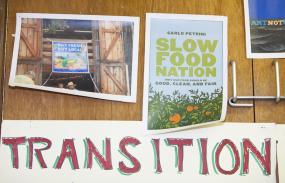 What did you eat for dinner last night? Take a minute to think about every ingredient, where it came from, how it was made. Can you identify the exact origin of any of the components of your meal?
What did you eat for dinner last night? Take a minute to think about every ingredient, where it came from, how it was made. Can you identify the exact origin of any of the components of your meal?
The food supply chain in the UK has become so complex that most people would find it nearly impossible to pin down exactly where most of their food comes from.
A year has passed since the “Horsemeat Scandal” revealed the level of discontent between food producers and the public, yet no prosecutions have been made in this large-scale fraud.
Investigations revealed that ABP, the factory that supplied Tesco, Co-op, Aldi and Burger King with their 26 percent horse “beef burgers”, used multiple ingredients from around 40 different suppliers in each production batch, the content of which could vary every half hour.
ABP, short for Anglo-Irish Beef Processors, is the leading processor of cattle in Europe, supplying around 50 million Europeans with meat products each week. This terrifying statistic has made consumers rethink their food choices in the wake of the scandal.
A wave of demand is surging amongst consumers for food producers to state the traceability of their products, and a growing number of organisations are rising to that challenge.
Traceability is, as stated by foodtraceability.co.uk, the ability to trace food back to origin, thus bestowing upon the consumer peace of mind and confidence in the food they buy. Traceability may also give a distinct advantage to producers whose means of production set them apart from their competitors in a positive way.
Windmill Organics is one company that is meeting the challenge head-on. Windmill’s brands Biona, Amisa, BioFAIR, Profusion and Raw Health are all organic, free of genetically modified ingredients, suitable for vegetarians, and contain no artificial additives.
Perhaps the most important product detail of the organic grocer, based out of Kingston upon Thames, is that they claim to “ensure 100 percent traceability, from farm inspectors, raw material suppliers, right though to the finished product”.
Their website says: “As a result we can guarantee the supply of consistently high quality foods, ethically produced with respect for the environment, for you to enjoy.”
For example, Windmill’s brand Biona clearly states that their popular virgin coconut oil is “ethically sourced from farmers co-operative in the Philippines”, as well as being unrefined, unbleached, non-deodorised, non-hydrogenated, cold-pressed, and free from cholesterol, trans-fats, and genetically modified ingredients.
Fear not, carnivores. Traceability does not necessarily mean that you must adopt a vegetarian lifestyle. At a time when meat consumption is at a record high, it is up to the consumer to demand a drastic change in the way meat and animal products are supplied.
Slow Food UK, a not-for-profit organisation that seeks to promote a better way to eat, states: “100 percent traceability is a crucial requirement for protecting our edible biodiversity, an issue particularly relevant to the sheep and cattle industries.”
The organisation believes that informed consumer decisions have the power to drive change from within the food system and raise awareness about the wider traceability issues faced by rare breed farmers, such as Blue Grey cattle, Old Gloucester cattle and Herdwick sheep, in the UK.
“From our daily experience there is a growing number of people who believe in the concept of good, clean and fair food. This notion also covers [knowing] where your food is coming from,” said Katharina Augustin, the Forgotten Foods Co-ordinator for Slow Food UK.
Slow Food UK is a proud supporter of the Eating Better campaign, which since its launch in July 2013 has garnered support from 35 organisations nationwide.
“Eating Better wants to encourage a culture where we place a greater value on the food we eat, the animals that provide it and the people who produce it,” said Clare Oxborrow, chairwoman of Eating Better and Friends of the Earth’s Senior Food and Farming Campaigner.
“In short, we need an Eating Better revolution – for food that is fairer, greener and healthier.”
As concern among producers and consumers grows, food retailers are feeling the pressure to stock highly traceable products.
“I would hope it does become a trend as it is quite important to know what you’re eating,” said Danielle of Panacea Health and Beauty, located in Kingston’s Bentall Centre. “But my experience in health food stores in the last eight years is that food is fashionable, as MPs, doctors and various high profile people voice their opinion on what is good or bad and people follow this.”
It is necessary to consider whether the traceability phenomenon is simply a passing fad or has the staying power to survive the often higher prices for traceable products.
“Even with organic food it seems to be fashionable, unfortunately”, continued Danielle, “as a lot of people do not make the effort to research why organic is better for you unless they have specific allergies, intolerances or passionate views. .
“They will often look at the price before considering the benefit.”
Despite the often higher prices for healthy and ethical food, health food businesses continue to excel. The share price for Whole Foods Markets stock on the NASDAQ has taken off in the last five years, up from $6.29 in January 2009 to $57.07 at the beginning of 2014. In the past year alone, the share price has increased $11.18 from $45.89 in January 2013.
The rising faith in the world’s largest natural and organic foods supermarket reflects their increasing standards of traceability, helping shoppers make conscious choices.
“Traceability is absolutely a big thing, especially for us,” said Alex Gilmour, a manager at Whole Foods’ Richmond shop. “Certain categories we take more seriously than others, say meat and seafood. We visit every single supplier to make sure that the traceability goes back and we know a lot of those farmers personally.”
Walk in to the Whole Foods Richmond location on a Saturday afternoon and witness the great bustle of the store first hand. The scent of essential oils melts your worries away, despite that fact that you’re standing in a long line to pay for your organic natural food. Judging by the vast number of people packed in to the store, there is little doubt that the business is going well.
So the next time you tuck in to a meal, take a good look down at your plate and have a think about where every ingredient came from. It might just open your eyes more than your stomach.
For more information on Slow Food UK, visit their website www.slowfood.org.uk
Image courtesy of Rex Features/Global Warming Images




